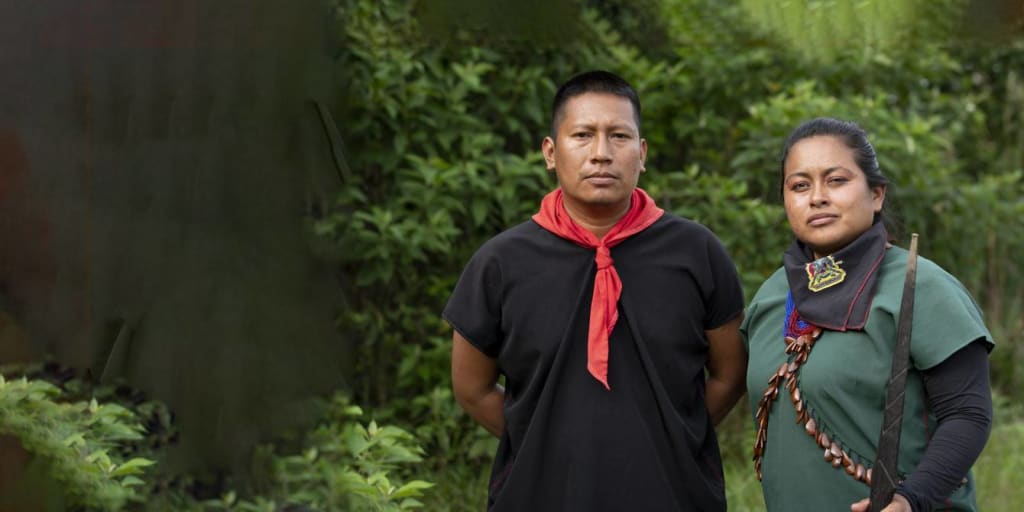
Ecuadorians Alex Lucitante and Alexandra Narváez, two indigenous youths from the native A'i Cofán people, are the only two Latin American winners of the Goldman Prize 2022 for winning a historic legal victory that protected their territories in the Ecuadorian Amazon from gold mining.
Along with the indigenous couple from Ecuador, among the winners announced Wednesday of the Goldman Prize, considered the Nobel Prize for the environment, there is also the American Nalleli Cobo, the Dutch Marjan Minnesma, the Thai Niwat Roykaew, the Australian Julien Vincent and the Nigerian Chima Williams.
Thanks to the leadership of Alex Lucitante and Alexandra Narváez, the Ecuadorian judiciary ruled in favor of the indigenous A'i Cofán people by annulling 52 illegal gold mining concessions granted without the consent of the native community of Sinangoe, located at the foot of the Andes, outside the Cayambe-Coca National Park.
This victory won in 2018 in the courts made it possible to protect nearly 32,000 hectares of virgin and biodiverse rainforest in the headwaters of Ecuador's Aguarico River, the award organization recalled in a statement.
Alex Lucitante, 29, a law student, comes from a family of traditional healers and is a member of the Ceibo Alliance, an indigenous coalition that unites the indigenous nationalities of the northeastern Ecuadorian Amazon to protect their territories, rights and cultures.
For her part, Alexandra Narváez, 30, formed the indigenous guard in 2017 to monitor and curb illegal activities within her territory and also joined the Shamec'co women's association, which seeks strategies to continue caring for the territory and her children's legacy.
In 2017, the Sinangoe guard began to detect improvised mining camps along riverbanks in remote sectors of the community and within the national park, with loggers, poachers and illegal artisanal gold miners actively operating.
After the discovery of the mining operations and concessions, Lucitante and Narváez sought to unify the community and formulate a plan to protect their territory.
Vigilance and denunciation
Thus, the community, with the support of allied organizations, developed a strategy to monitor the area impacted by mining with technology and tours of the indigenous guard and redoubled patrols on foot and by boat to detect and denounce illegal mining, logging and fishing in the territory.
While Narváez participated in the guard's tours and served as spokesperson for the community, Lucitante participated in legal and media strategies to gather support, until 60 national and international organizations and 14 local communities joined the campaign.
In May 2018, Sinangoe filed a lawsuit against the State for violating their rights as an indigenous community and granting mining concessions without consultation or consent of the Cofán, resulting in the historic ruling in favor of the indigenous people.
The ruling closed the door to gold mining in the ancestral territory of Sinangoe, home to the Cofán, whose territory lies within a biodiverse rainforest in the headwaters of the Aguarico River, a tributary of the Amazon River.
The ancestral territory of the Cofán of Sinangoe, located in northern Ecuador in around the Cayambe-Coca National Park, covers more than 1,500 square miles of rainforests, wetlands, glacial lagoons, and snowcapped mountains, including the Cayambe volcano. The area is home to 3,000 species of plants, 50 mammal species, 650 bird species, and 100 types of reptiles and amphibians. Additionally, the region is among the most carbon-dense pockets in the Amazon.
Connected to land and water
The Cofán are a small indigenous people, composed of 1,200 people and their culture is deeply connected to the land and water, so their way of life depends on rivers and forests, with a dependence on subsistence agriculture, hunting and wild harvesting.
For Alex Lucitante and Alexandra Narváez, it is the A'i Cofán community of Sinangoe that deserves this award, so they decided to donate the economic prize, so that it will be transferred directly to a civil society organization formed by communities of four indigenous nationalities of the Ecuadorian Amazon.
***
Thank you for reading this. If you liked my writing, please subscribe and click the little heart below this piece or near my name, at the top of this page.
About the Creator
Emby Lat
I like movies, technology, games, art and anything that I find interesting.






Comments
There are no comments for this story
Be the first to respond and start the conversation.